I’m not sure how much you’ve been keeping up with central North Carolina weather – I assume a lot, as it’s wildly compelling to everyone with their fingers on the pulse of the culture – but it’s been kind of a soggy wet mess here lately. That’s been bad for a lot of people here – there’s been plenty of flooding and people losing homes so let’s just keep that in mind as I kvetch to you about my wildly insignificant problem here. But kvetch I will, because boy am I confused.
So, it’s been raining all the flapjacking time, so that’s made it tricky to work on my Citroën 2CV, which I desperately want to get running, and soon. I put a new fuel pump in but so far I haven’t gotten it to run just yet. I will! With some help and a bit of actual weather that you can be in without getting soaked, I mean.
Oh, and that rod sticking out from under the hood alarmingly in the topshot is an old shovel handle I use to keep the hood up, and I have one of the headlights out to try and get it cleaned out. Just keeping you in the loop.
Anyway, the rain finally has been letting up a bit, so I got to spend a bit of time with the car, which is when I noticed these strange puddles of water. I took the front seats out to clean them and replace some of the thick rubber bands that form the support structure of the seat, so the whole floor is very visible, which is why these puddles are so obvious. Here’s the first one:
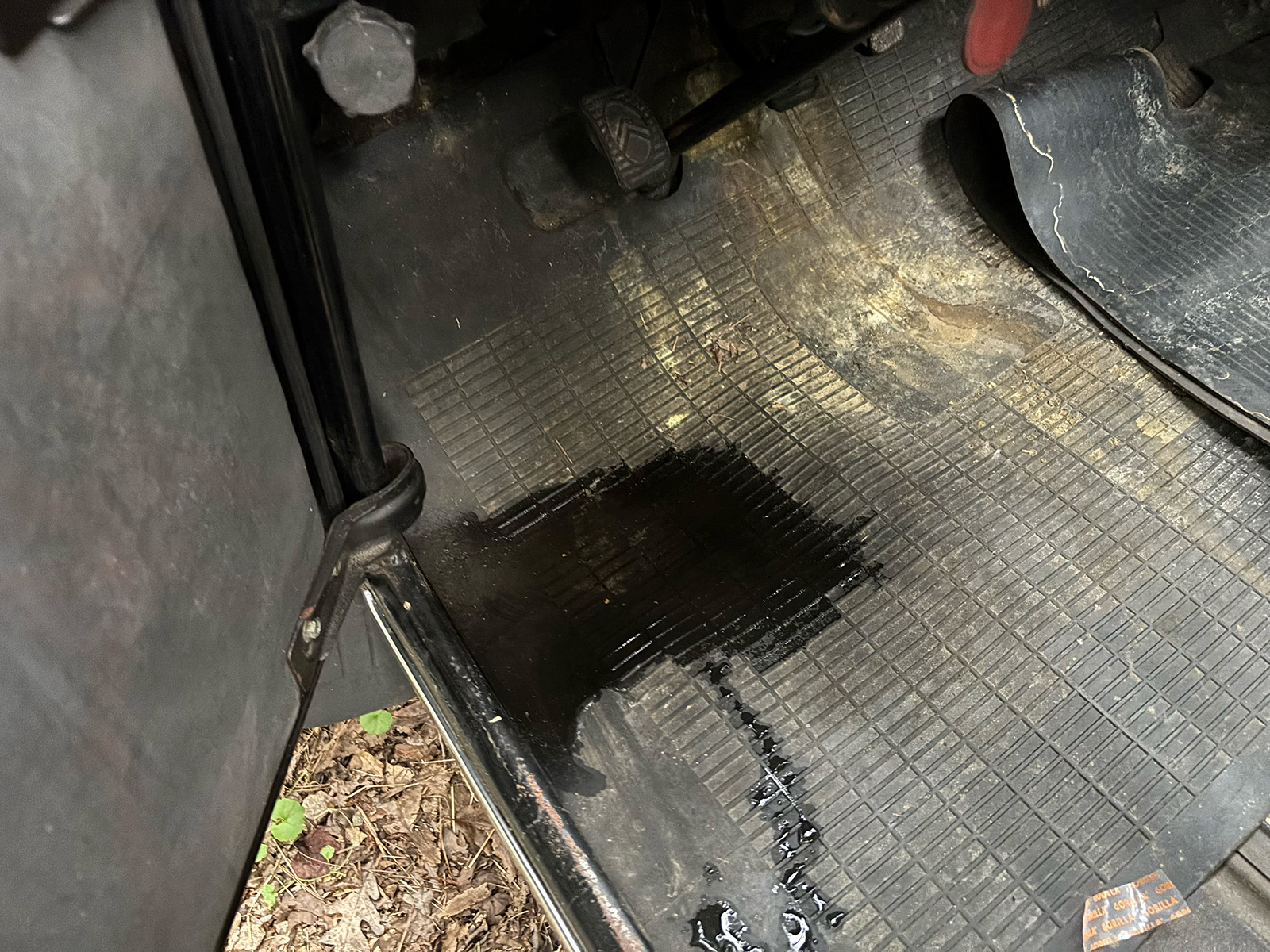
It’s right by the front door edge, and there is a rust hole under that mat, so perhaps this one has been happening a while. But I can’t figure out where its coming from!

The underside of the dash is dry. The edge of the door is dry, and the weatherstripping seems dry and intact. The windshield weatherstripping seems dry and intact. Nothing above the floor seems wet!
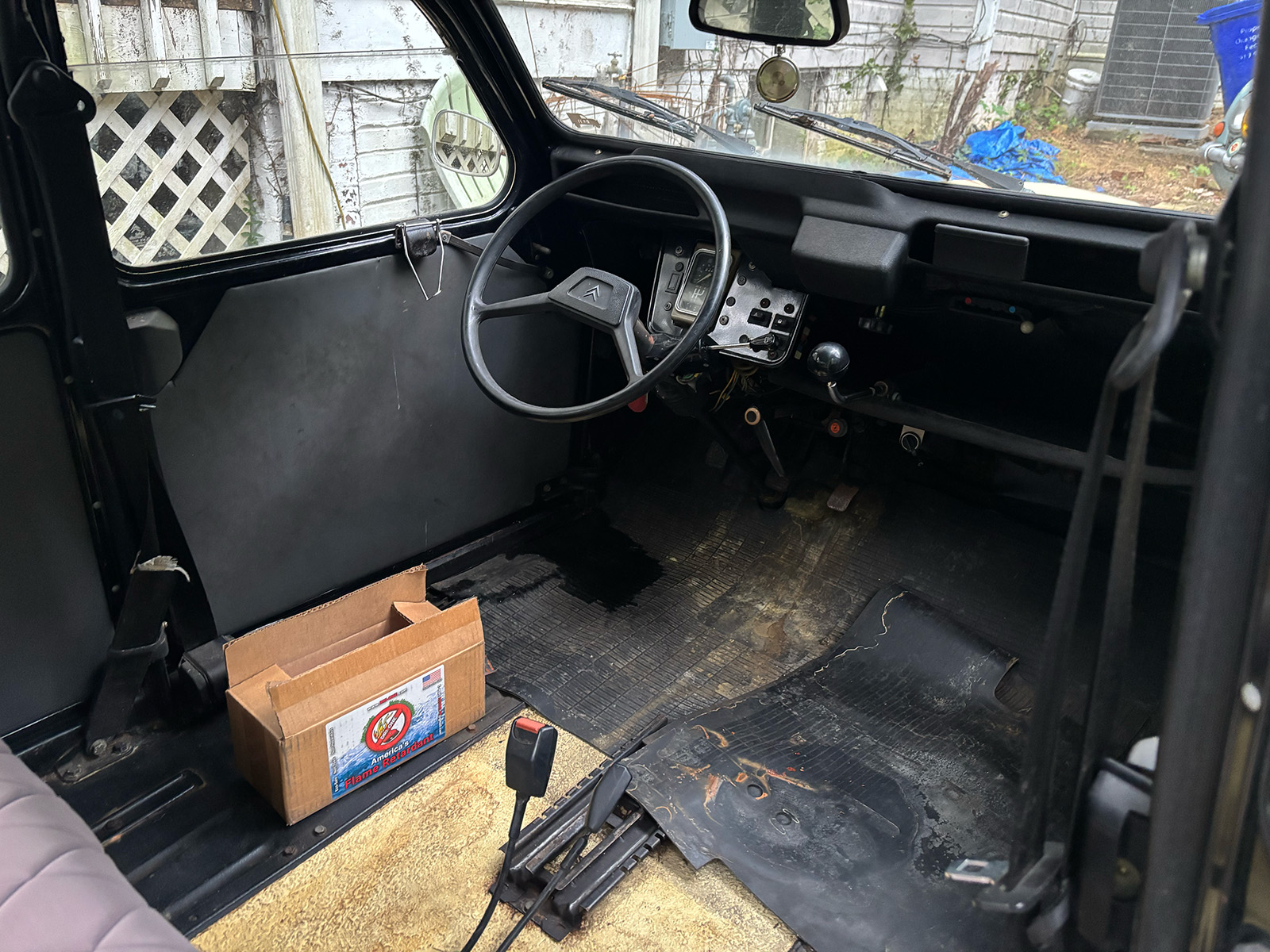
The window seal is fine, too. And the fabric roof is new and free of holes, and I can’t see or feel any water on the ceiling. Where the hell is this puddle coming from?
Here’s the other place where water seems to be pooling:
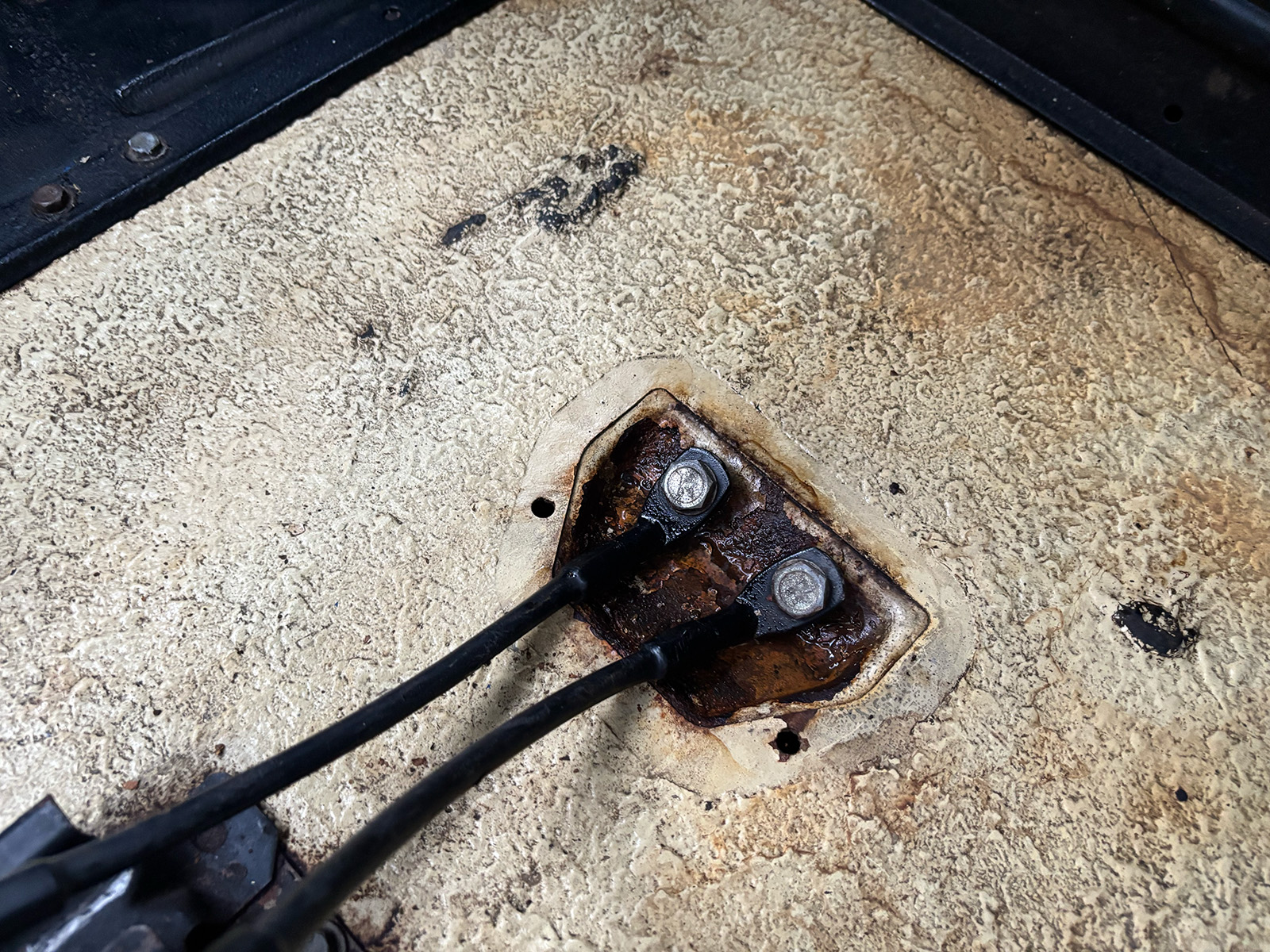
Right in the center, where the seat belts are mounted, which is a little alarming. There’s rust in there, but luckily it seems to be mostly surface and the metal is still sound. Still, I’d rather this important structural point on the car wasn’t filling with water.
Again, I have no idea where this water is coming from? The roof above it is dry and doesn’t seem to be leaking at all:
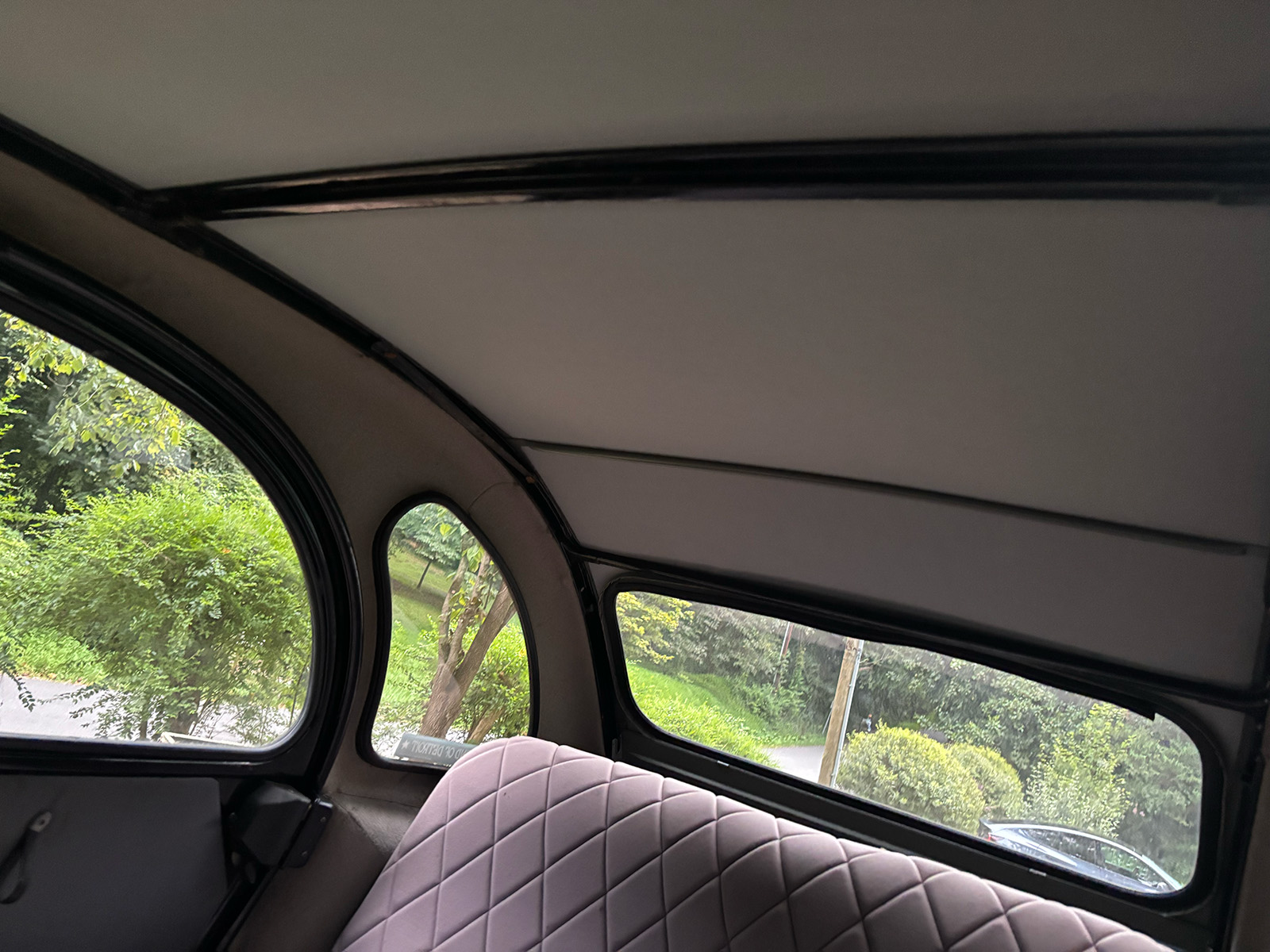
Where the hell is this water coming from? Below? That’s not possible, is it? At least according to how I understand water and gravity to work here on Earth. At least normally.
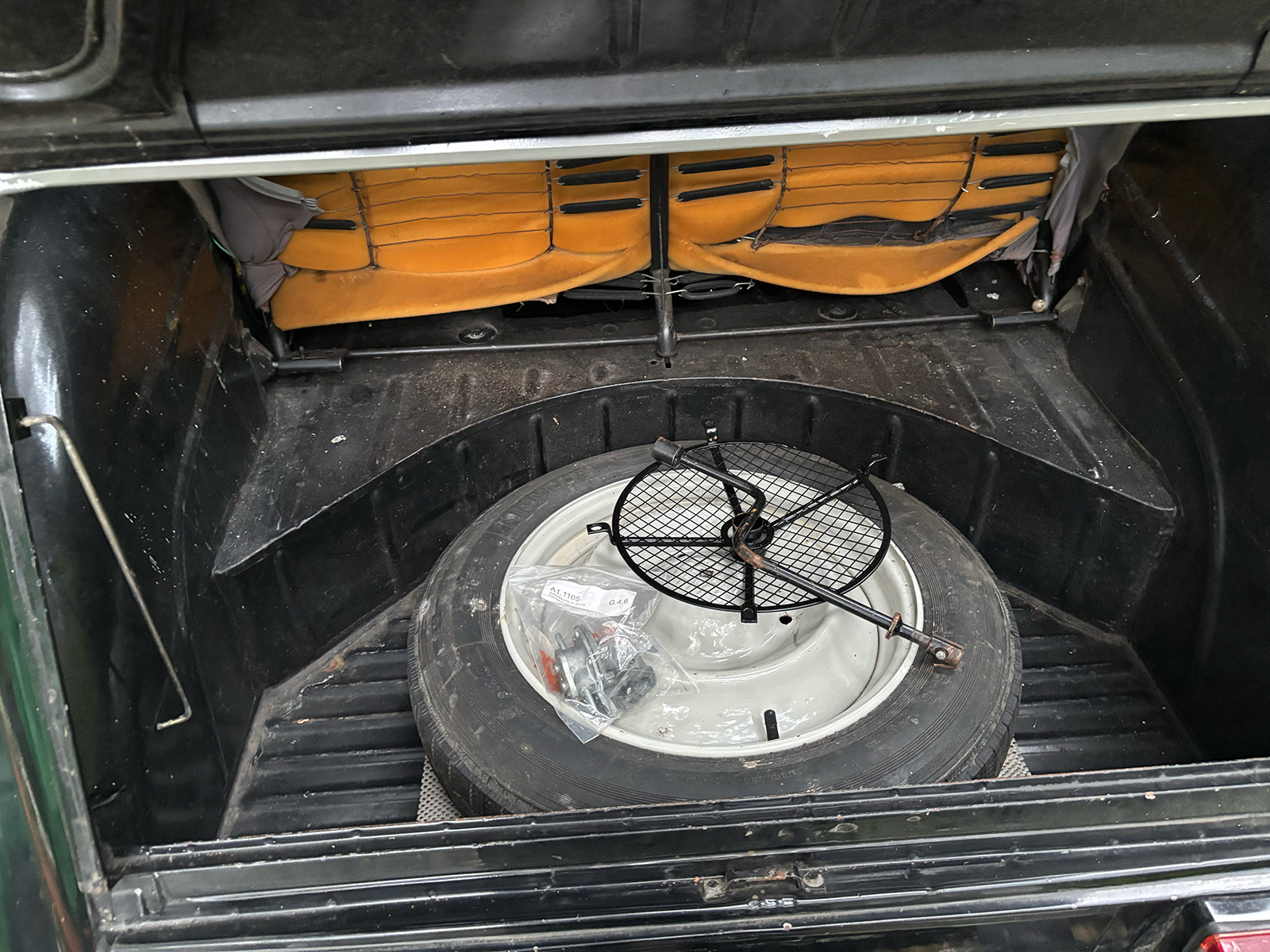
The trunk is dry, too, which speaks to the roof sealing well.
So, again, what the hell is going on? Why are these two spots mysteriously filling with water? Where is this water coming from? Do these cars sweat? Is the water opening the doors, then closing them? I’m baffled here. Any ideas are welcome!









Make sure everything is sealed up and have someone sit inside with a flashlight while you hose it down.Start at the top and slowly work around.Water comes in from surprising areas and doesn’t really take much to make a small puddle.A bright light from outside the car in the dark can also work.If all else fails a DIY smoke machine will work.
One tip I learned from my father in law: Use a clean dry paper towel to check for leaks. The paper towel will soak up and display water in much smaller amounts than you might be able to detect with your eyes or fingers. Plus you can cram the paper towel into places that you may not be able to easily see..
My votes on condensation, but this seems a little extreme for that. On the other hand I remember waking up at Carolina Motorsports park and the entire interior of the race car is soaked despite having a cover and no rain. Doubt it can explain the floor pan puddle, but assuming the car is well sealed other than said rust hole, the seatbelt mount may be one of the last exposed areas to warm up in a humid morning.
Put a light coat of baby powder or chalk dust and an old go-pro or phone in there and set it to timelapse and wait for either a big temperature swing or a rain storm.
Perhaps if the 2CV weren’t full of air holes, yes, but I can’t see one being actually tight enough for that to happen.
I wholeheartedly disagree. You get much less condensation overnight on your windshield if you leave your windows cracked open in spring / fall months. Much like the only way to fix a fogging sealed tail light is to drill a tiny pinhole at the bottom. (I lived in SC for 15 years) The worst is on a race car that has no insulation, sound deadening, or anything on either side of the sheet metal. One commenter hinted that having it under a car cover makes the problem worse which is what I’ve personally started to suspect having walked around the paddock early in the morning.
You may be right. I’m wrong a lot. 🙂
The window/door seals are most likely the main culprit, and the traces of water won’t always be visible. I have the same thing happen on the Travelall, and all of the weatherstripping is new. Your best bet is to go out there and sit in it for an hour during a rainstorm, and keep looking for leaks.
I was going to say that this is when Otto gets his first investigative journalism job. Paid to sit in a car in the rain. Like a private detective.
Sitting in a 2CV in the rain is the Frenchest thing to ever French.
Is sitting in an Austin-Healey in the rain is the most British thing to ever British?
The Britishest, yes.
only if you’re on strike, and sipping wine with your mistress.
It’s coming from the front flap. It’s never tight. Doors aren’t either.
Have you traced where air ventilation runs between any exterior collection points (near the windshield, edges of top rails, etc) too see if there’s a clogged water drain somewhere that’s backing water up and spilling it out from behind the dash?
I know it’s a long shot, but my Miata did that to me. The A/C condensation drain got clogged and the condensation backed up and leaked out from behind the dash. Of course a 2CV doesn’t have A/C, but there still may be places where water is supposed to drain through the body and it’s either clogged or rusted.
There is of course the possibility that a member of your family hates the car and is secretly pouring water into it when you’re not looking… hoping that you’ll eventually get rid of it in a fit of rage 🙂
Yeah.. um…water…. that’s what they’re pouring into it.
Could be sleepwalking.
I had both a 78 rabbit and a 06 express van that both leaked. The window seals were fine but the metal UNDER the seals was rusty and allowed the leaking. I would check under the window seals.
Yeah my rusty TJ had this problem, and the water was leaking onto the blower motor under the dash, the third blower failure in a year is what pushed me to sell the thing. It was no good as a winter ride if I had no heat.
My ex and I like 33 years ago test drove a CJ with a propane heater strapped to the center hump for heat. Hard no on that one.
That’s a crazy set up. I had a 73 CJ-5 and don’t remember anything being very hard to get at. The heater core started leaking on our 99 XJ and replacing that is a PITA. Because I was curious, I hooked the heater hoses up to the AC evaporator core instead and got heat. AC wasn’t working anyway.
Have you been getting a lot of wind with the rain? A good gust of wind could lift the roof or push a window in just enough to allow some water in.
My first thought, if there’s no visible point of ingress, is that it must be hot enough that either the water trickles inwhile it rains and then its trail evaporates, leaving only the puddle, or water vapor is entering the car, condensing and collecting at the local low points, and the cycle is repeating until there’s visible collection. I would do what @76Eldorado suggested, and if that fails, get up really early one morning and check if there’s any dew inside the car.
Rain so frequent it’s gone extra-capillary!
What if the car were turned upside down?
Sounds like you’re going to have to blog from inside the car during heavy rain (later today, perhaps? The blogoverse needs to know!) or set up a sprinkler on a sunny day perhaps?
Spray bottle of water with some fluorescent yellow dye in it, so that the leak becomes super-visible with application of UV light.
“Must be the water.”
The next time the forecast calls for downward-facing water, perhaps you could set up a camera or three inside the car.
Also I had an idea re: the seat belt mount. When possible, dry out the low spot with a hair dryer or heat gun; remove loose rust and spritz the metal with something like Rustoleum Rust Reformer to stop/hinder further oxidation; then use the hair dryer/heat gun to melt candle wax into the low spot. Et voila – no more low spot and if you need to pull the seat belts, the wax can easily be removed.
Think of it as a sort of paraffin raclette.
love this. Beeswax perhaps for a nice apiary/craft vibe? i kinda want to coat my Eff Tree Fitty’s rusting frame and body panels sections in beeswax undercoat now
Beeswax has a lower melting point than paraffin, so, easier work with the hair dryer.
Low enough to melt in a hot car?
Ok, so this is vexing me now. We did a lot of crafts as kids in my house, including making candles. And I had learned that paraffin has a high melting point, and beeswax has a lower melting point.
Looking it up wikipedia-style now, I see paraffin at “a typical melting point between about 46 and 68 °C (115 and 154 °F)“, and beeswax at “a relatively low range of 62 to 64 °C (144 to 147 °F). So, fully overlapping, and paraffin can be lower? I think the two options would either don’t worry about it, or look into ski waxes, whose formulation is more controlled.
I can see paraffin having the wider range, due to being produced from petroleum and so having a range of possible compositions depending on application. Whereas on the other hand bees.
This is a great and weirdly appealing idea
Thank you 🙂 If you decide to implement it, please write it up
Use a scented candle and your wax seal will also serve as an air freshener.
I wonder if bath and body works sells a rusty jeep parts scented candle…
Second dumbest idea I ever sarcastically recommended that accidentally turned into a success was when asked for birthday ideas for my best friend by his girlfriend at the time I suggested she make him a bacon candle. (roughly 90% wax and 10% bacon fat) Apparently it turned out amazing and several other people asked her to make one, but I personally am not a bacon or pork guy except for a good tenderloin due to taste preferences and hated it.
I was also thinking that he can used Sugru or a similar adhesive hardening clayish thing to make a small dam circling that mounting point, like a berm. Then the water would have to be high enough to breach it in order to get to the area.
Obviously you have done something to irritate the goddess. I guess you should recheck one of the 600+ commandments in Deuteronomy and locate your transgression. Alternatively a sage burning may do the trick. Bon chance
Well, at least its not coolant…
Check under the windshield weatherstripping if you can. I had water getting in to a truck because of rust under the weatherstripping. Same with my wife’s Honda. As for why water is collecting in those areas, I was always taught that water always seeks it’s own level. Those are likely the lowest spots in the car, so water will end up there.
What does it taste like?
rich and nutty, sort of like a comte cheese
That’s good, a well developed flavor.
As long as it doesn’t have that sweet fake Riesling aftertaste, then you start to worry.
Don’t fix the leak, you might grow truffles in the floor pan.
What does the pig say?
The pig is high as fuck. Wrong mushrooms.
Not again!
“Hon hon hon”
So, the internet tells me this thing weighs about 1,300 pounds. I think it’s imparting lightness to everything around it, and water is levitating from the ground through the floor. This is known as the Chapman Effect.
The water is probably coming in somewhere else and running to the low spots. I bet it’s the vent under the windshield dripping close to the middle. Maybe you could trace where the water runs from with a light dusting of baby powder.
Yip, or the vent was left open, easy enough to do. Other possibility is the front corner of the door, but that usually happens when moving. Could be the wind was so strong the car thought it was moving in the rain and let water in to show its displeasure…
Needs to be death with quickly, cutting and welding patches is difficult to do without compromising structural strength — in France most people just buy entire floor pans when that happens.
This was essentially how we tracked water leaks in corrosion protection testing at Honda, but using an aerosol that dried to a white powder for easy application. Baby powder is a good alternative.
I also recommend putting in a camera on time-lapse.
I had a similar issue with a brand new 2008 Honda Civic. I only noticed because I had the all weather rubber floor mats and noticed a pool of water while looking over my shoulder to back out of the driveway. Washing the car didn’t really produce a noticeable effect, but heavy rain did. Turns out the weather stripping on the rear passenger door was installed incorrectly from the factory allowing water to leak in.
While this won’t be of any help, it will at least illustrate how common this type of problem can be. I was working on a project at a high-end shopping center, and the owner was pulling out a two-story fountain that was a part of the staircase between floors. I asked him why he was pulling it out since it was an iconic element of the space.
I apparently hit a nerve because he went on a 10-minute rant about what a pain the fountain had been for the last thirty years. He said it had leaked for about five years after it was first installed, and he had spent more money on fountain upkeep than all other maintenance combined. The thing he said really pissed him off was that they hired their fourth fountain specialist; the guy had told him simply that “Water finds a way.”
This fountain guru informed the owner that where you find evidence of a leak, it rarely has much of a relationship to the leak itself. He had seen situations where a fountain leaked into a hidden space where it would pool up and evaporate. That the humidity would then condense on a cooler outside wall, drip down to a set of HVAC piping, run down the pipes, and then drip onto the drop-ceiling in a basement office that was two stories below and 30 yards away. The property owners had spent more than a decade replacing the ceiling tile repeatedly because no matter how many times they told their maintenance crew about it, nobody could figure out where it came from. Only after their fountain had a bigger failure did they discover what was happening.
Good luck!
Explains why water features, which used to be de rigeur for shopping malls, now are not.
Shopping malls themselves aren’t exactly de rigeur anymore.
True. Though the rich people ones are doing better (sans water features).
Eh, those were to help provide evaporative cooling in summer and humidification in winter because the HVAC systems of the day really weren’t up to the task — particularly cooling such large, open spaces. And even today, keeping heating systems for large space from drying the air excessively is still a challenge.
Shopping malls are becoming an endangered species, and the remaining ones have often been remodeled sufficiently to eliminate anything that requires extra maintenance where possible.
With climate change clearly upon us, all sorts of weird moisture things are happening out there. Overnight lows that barely get under 80 are making for some extremely humid mornings.
Is the car parked out in the rain? Or is it under cover, which could point to a condensation issue?
Our north-facing driveway grew lichen/moss/algae for the first time in the 50 years we’ve been here (CT). I think CT is going to develop a more Seattle-like climate, at least until it gets too hot to sustain that.
Get the garden hose and have some spray the car all over with you in and look for where the water comes in. That is how we did it at the body shop.
This is a great idea!
Ding, my thoughts exactly, but with a water bottle, LOL.
I wouldn’t trust a 2CV to be perfectly sealed anyway. iMHO, this car should be in a garage, or at least under a temp tent thingy. Too special to leave out in the full elements.
Compromise: a pump sprayer.
I had rather bigger puddles (2-3″ in the footwell) in my 2017 Insignia. The next rain solved the puzzle: The drainage tunnels from the roof downwards were clogged and the overspill made its way through the dashboard into the footwell. But I suppose the 2CV (did you know they are commonly known as “Ente” i.e. “duck” in German-speaking countries?) doesn’t have such convoluted drainage arrangements.
My Juke gets water in the footwell / floor pan which happens to be where the AWD computer is. So the AWD light comes on for a while until it dries out.
I put flex tape around the sunroof and it seems to have mostly stopped. I never use it anyway and I can’t be arsed to track down leaks in the sunroof drain system.
Hiya Torch!
You could try contacting Ian Seabrook of Hubnut fame on Youtube? He’s a nice guy and has owned the same 2CV (Elly!) for like…20 years and may have a good idea where you could check?
https://www.youtube.com/hubnut
Just loving the fact one of the Autopian crew has a 2CV now!!!
He was going to be my suggestion too!!! I get the impression that Torch and Hubnut, are like twins separated by the Atlantic…
“Gravity works” and “Water follows the path of least resistance”. I’d be looking at the door seals* and any penetrations in or around the firewall.
*Besides being pliable, the door seals need to be touching the door frames when the doors are closed. See if you’re seeing any daylight and adjust accordingly. Good luck!